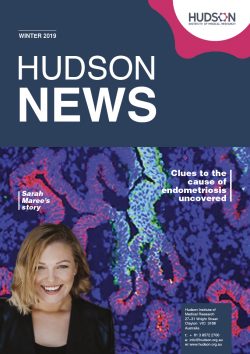When it comes to conception, it has long been accepted that a mother’s lifestyle choices can affect a child’s development. But could a father’s behaviour be just as important?
Hudson Institute scientists have identified a new pathway of non-genetic inheritance that could one day link a father’s lifestyle choices, including diet, alcohol, drugs, smoking and medications, to the development of his children.
The study, led by Dr Patrick Western and Dr Jessica Stringer, looked at epigenetics – heritable marks in the DNA that act like a set of instructions, or ‘road-map’, that defines cell types in the body.
These pathways can be disrupted by exposure to lifestyle factors like diet, drugs and chemicals, providing a means by which health and lifestyle of a parent can affect his or her future children.
In the study, Dr Western and Dr Stringer found that an epigenetic modifying complex, called PRC2, regulates nongenetic information transmitted from a father to his offspring.
“For the first time, we demonstrated that altered function of PRC2 in mouse sperm, before eggs are fertilised, caused epigenetic effects on development and gene expression in the father’s offspring,” Dr Stringer explained.
The study is a big step forward in our understanding of how a parent’s diet and lifestyle can affect children. Research has previously suggested that if a parent has a poor diet, they significantly increase the risk of obesity for future generations – including in children and grandchildren. However, in many cases the specific epigenetic factors at play have been unclear.
“Now we’ve shown that PRC2-dependent epigenetic changes in sperm can be ‘inherited’ by offspring from their fathers, we can start to look at whether specific foods or chemicals might positively or negatively affect PRC2 function and, therefore, development in children.
“For example, in future work, we will look at how specific drugs, diets or environmental factors affect the sperm epigenome and provide up-to-date information to men wanting to become fathers. Similarly, further work may explain how environmental factors mediate inter-generational health impacts where genetic mutations are excluded.”
For now, Dr Western said that fathers needed to be mindful of their role in conceiving a healthy child.
“When thinking of starting or adding to their family, both mum and dad should try to be as healthy as possible,” Dr Western said.
Collaborators: Monash University; University of Adelaide; University of Melbourne
WHAT IS EPIGENETICS?
Epigenetics refers to heritable marks in the DNA that determine whether a gene can be ‘switched’ on and off, changing how cells read genes, without causing changes in the underlying DNA sequence.
The epigenome provides a layer of complexity on top of our DNA. It’s like a set of instructions or ‘road-map’ that defines cell types in the body.
Epigenetic control of genes is part of what allows a tiny cluster of identical cells in the womb to grow into a fully formed baby. By regulating different sets of genes that can be switched on and off, some cells become heart cells while others become brain cells.
Importantly, epigenetic pathways can be disrupted by exposure to lifestyle factors, like diet, drugs and chemicals, providing a means by which health state in a parent can affect his or her future children.

